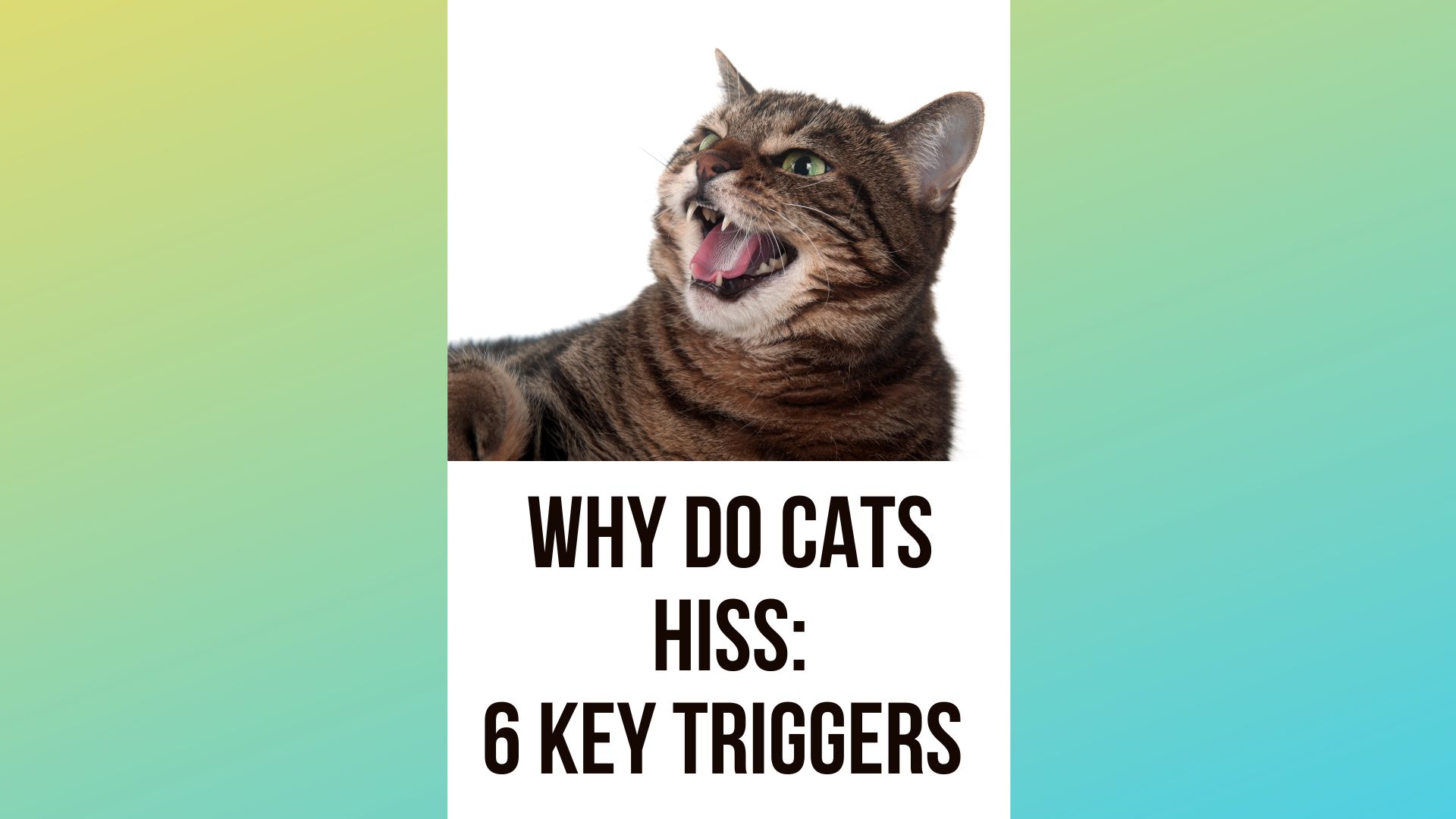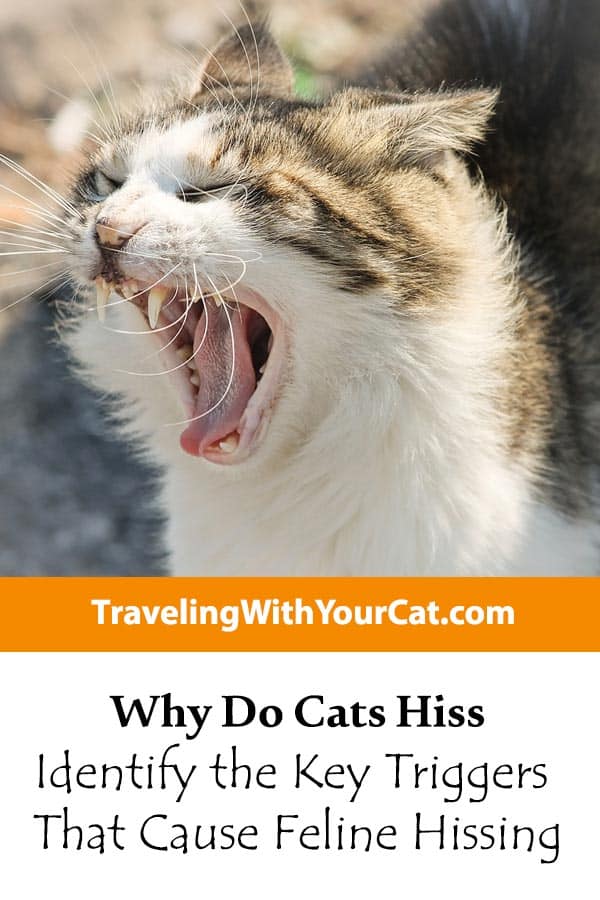
A cat hiss is an unmistakable sound. While a hiss is essentially just a sharp exhale of air through the cat’s mouth, it sounds much more sinister than that!
In fact, it is meant to sound sinister or at least scary. Cats don’t hiss when they are happy and content. They hiss when something is amiss in their world.
In this article, we delve into the key triggers and situations that may cause your cat to feel like hissing is the best response.
We also talk about how you can address the hissing to keep your cat calm, comfortable, and content.
Why Do Cats Hiss
Cats hiss to indicate something in their environment is not to their liking. Feline hissing is most commonly associated with fear but it can also indicate pain or general upset.
Because your cat cannot tell you why they are hissing in human language, it is important to learn all you can about this behavior to know how to address it.
Learn About Cats Hissing From a Feline Veterinary Expert
In this short YouTube video, you can learn about some common reasons that may cause a cat to hiss.
The more closely you can observe your cat’s behavior, the more likely you are to identify triggers that cause your cat to hiss and address them.
Common Reasons Why Cats Hiss
The sound of a cat hissing is unmistakable. Even people who are not familiar with feline behavior typically have no trouble identifying a cat hiss as a sound of warning.
The cat is using the hissing sound as a form of communication. And the message is clearly not a welcoming one.
But, Why do cats hiss? Is there data to explain why a cat would make a hissing sound versus using some other communication tool?
In this section, we outline what feline experts say about the most common reasons why cats hiss.
Aggression
Vetstreet states that when a cat feels threatened, they may attempt to make themselves appear bigger and more dangerous than they are by hissing.
Cats typically accompany hissing by flattening their ears and baring their teeth and may follow it up with scratching or biting when the hiss is not heeded.
Fear
Some cats are more tolerant of sudden changes than others. Fear-based hissing may arise when something changes in your cat’s environment and your cat doesn’t know if this represents a risk or a danger or not.
Common environmental changes that may provoke hissing could include a move to a new home, the addition or departure of a family member (animal or human), schedule changes, or even a change to a new food.
Territoriality
Territoriality may provoke hissing when a cat feels like its home or turf is being challenged.
A cat’s territorial instincts may get triggered by something as simple as watching a feral cat wander into its yard.
Misplaced predatory response
In a wild setting, cats eat a diet of pure animal protein such as small birds, rodents, lizards, and even insects.
Cats can easily get confused by the presence of smaller household pets like birds or rodents that they might regard as prey in a wild setting. The hissing in this context may be a predatory response.
Over-stimulation
As Maddie’s Fund animal charity explains, not all cats tolerate handling and petting equally well.
Some cats may also become aggressive with too much handling or petting. This may occur when you are petting them in an “off-limits” area or just when they have reached the limit of their tolerance for contact.
Bullying
Not all cats tolerate other family cats or pets equally well. In some cases, there may be bullying or territoriality that is going on that may cause hissing as each animal attempts to define their boundaries and their personal space.
Conflicts over food, litter boxes, resting spots, toys, and even their owners may prompt a cat to hiss.

Hissing and Other Cat Body Language to Watch For
Hissing is an unmistakable signal that all is not well with your cat in their world. But other body language signals can accompany hissing that you will also want to watch for.
Flattened ears
According to Cornell University College of Veterinary Medicine, when a cat flattens their ears while making a hissing sound, this is a form of fear-based aggression.
Flattened whiskers
As VCA Animal Hospital explains, a cat’s whiskers are more than just extra-long hairs on a cat’s body.
They are sensory communication tools not unlike an insect’s antennae.
So when a cat flattens their whiskers and pulls them in towards the face, this is an indication that the cat feels threatened and is protecting one of its most valued communication tools.
Dilated pupils
Dilated pupils in a cat can indicate fear, territoriality, or simple excitement.
As Michelson Found Animals explains, fully dilated pupils are a common indicator of feline excitement.
But if your cat’s pupils look like tiny dots, it is time to back up. Your cat is likely preparing to attack.
Bared fangs
There is no positive interpretation of a cat’s bared fangs. When you hear a hiss and see bared fangs, you will want to give your cat plenty of space!
Waving tail
A waving tail is one of the most confusing body language signals for cat owners. In dogs, a waving or wagging tail is typically interpreted as a sign of friendliness or welcome.
In cats, a waving tail is generally interpreted similarly. For example, a cat that is simply excited at the presentation of a favorite toy or treat may hiss and wave its tail.
A hiss here may simply indicate excitement (or possibly overstimulation) rather than fearfulness or outright aggression.
Flattened tail
As Wedgewood Pharmacy points out, a cat’s tail is similar to the whiskers in terms of being a communication tool.
If your cat feels threatened, bullied, fearful, or simply unsure, you can bet the tail will change position to express this.
When a cat flattens their tail against its body, this is a defensive position that indicates the cat is feeling threatened and may exhibit aggression if challenged.
- Why Do Cats Eat Toilet Paper, Will It Hurt Them
- Why Do Cats Sit On Paper: Decoding Strange Feline Behaviour
How to Help Your Cat Stop Hissing
The first step to helping your cat stop hissing is to identify what is triggering the hissing behavior.
As PetMD points out, one of the biggest misconceptions among cat owners is that a hissing cat is behaving in an overly aggressive manner by hissing.
Often the hissing cat is actually being bullied or terrorized in some way and is hissing simply to create some distance between them and the perceived threat.
Similarly, cats often get thrown off balance when their human family moves to a new place or even changes anything about the cat’s home life, from bedding or food to the daily schedule or introduction of a new baby or additional pet.
To a cat, this can signal danger and may provoke hissing and other defensive behaviors.
As the ASPCA points out, hissing can sometimes be the outcome of a cat in pain or having medical issues.
This is why it is vital to have your cat examined by a qualified feline veterinarian.
In this way, you can identify the root cause of the hissing and address it at its source.

Hi, This is Alexa, and I love cats. This Website is a Complete Journal about how to travel with a cat and other information about Cat Health, Cat Training, Cat Behavior, Cat Foods and more. I hope you find it useful.
